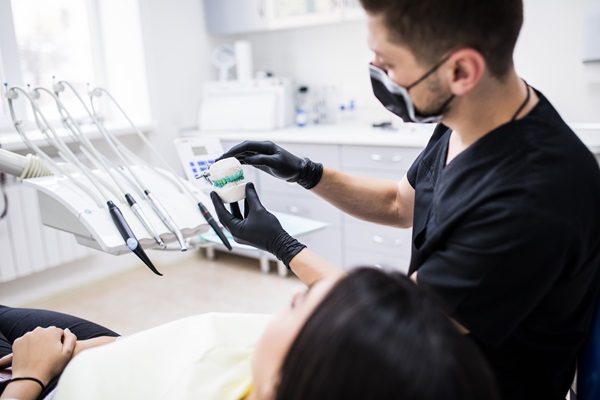Do I Need a Root Canal Federal Way, WA
Root canals can save or repair teeth that have been damaged by infection or decay. When a tooth does not get needed root canal treatment, the surrounding tissue may become infected and surrounded by abscesses. Root canals consist of removing the inflamed and infected nerve and pulp of the tooth.
Root canals are available at Smile Center Dental Care in Federal Way and the surrounding area. Do not put off saving your tooth. Call us today at (253) 326-6230 to schedule an appointment and learn more.
Pain Relief Through Root Canal Treatment
Root canal treatment aims to relieve pain first and foremost. Many patients experience pain as the main symptom and feel it develop beyond a simple toothache. Pain can stem from deep in the bone of a tooth and feel like the entire tooth or area of their mouth is aching. In many cases, a patient may also experience referred pain, which is pain felt in a different spot than that where the actual injury lies.
Root canal treatment resolves pain by removing decay and infection from inside the tooth's pulp and replacing infected roots with artificial ones. This way, we can help save the natural tooth structure and the tooth itself. The longer people avoid seeking this treatment, the pain can cause a dead tooth and require more intensive procedures such as an extraction.
“Root canal treatment resolves pain by removing decay and infection from inside the tooth’s pulp and replacing infected roots with artificial ones.”
Signs That Indicate Need for a Root Canal
Pain or discomfort surrounding a tooth can occur even when the tooth is not in use. One major sign that the pulp is infected is sensitivity to hot and cold stimuli. The American Association of Endodontists (AAE) lists other signs and symptoms that indicate a patient needs a root canal:
- Severe pain while chewing or biting
- Pimples on the gums
- A chipped or cracked tooth
- Lingering sensitivity to hot or cold, even after the sensation has been removed
- Swollen or tender gums
- Deep decay or darkening of the gums
“One major sign that the pulp is infected is sensitivity to hot and cold stimuli.”
When Root Canals Are the Only Option
Root canal treatments are necessary when the pulp of the tooth has become inflamed or infected and needs removal. This may happen due to deep decay, cracks or chips in the tooth, faulty crowns, and repeated dental procedures. Patients should also be warned that facial trauma may still damage the pulp even when the tooth does not have visible chips or cracks. Leaving pulp inflammation or infection untreated may lead to pain or the formation of an abscess.
When left untreated, teeth with damaged pulp eventually die. This can negatively impact your overall oral health, as well as make it difficult to eat and chew. Root canals can help preserve the remaining tooth. The procedure may be followed by the placement of an implant or a crown.
“Root canal treatments are necessary when the pulp of the tooth has become inflamed or infected and needs to be removed.”
Check out what others are saying about our dental services on Google: Do I Need a Root Canal in Federal Way, WA
Alternatives to Root Canals
Root canals can help address any issues caused by infection and decay. However, for such treatment to be successful, there must be enough of the natural tooth remaining to save. While it is best to save and maintain natural teeth whenever possible, some teeth may be beyond repair. Teeth with severe fractures or cracks extending below the gum line, for example, may be better suited for extraction.
If extraction is necessary, patients may want to consider getting dental implants. This tooth replacement option looks, feels, and functions like a natural tooth and will help maintain the appearance of the smile. Dental implants consist of artificial tooth roots surgically placed into the jaw to hold an artificial tooth (also known as a crown or pontic) in place. Our team can help determine which option is best for you.
“However, for such treatment to be successful, there must be enough of the natural tooth remaining to save.”
Questions Answered on This Page
Q. When are root canal treatments necessary?
Q. Are there any alternatives to root canals?
Q. Can I get pain relief through a root canal treatment?
Q. Are there signs that indicate I need for a root canal?
Q. Do I need an emergency root canal?
People Also Ask
Q. How common are root canals?
Q. How can I cope with dental anxiety?
Q. What are the benefits of a root canal?
Q. How can you save a tooth with a root canal?
Q. Are pain and tenderness when touching the teeth or chewing a sign of a problem?
Q. What are the services offered endodontists vs. general dentist?
Emergency Root Canals
An emergency root canal is often necessary when a patient is experiencing unbearable pain that may be affecting their oral functions. This may include biting, chewing, eating, and breathing normally without lingering pain or discomfort on one side. The mission of an emergency root canal treatment is to remove the damaged pulp completely and restore the tooth using an artificial tooth replacement.
Emergency root canals are typically performed in one visit with the second visit being the application of the tooth replacement. Tooth-replacement options include, but are not limited to, crowns, bridges, and dental implants. Dental implants, however, require a few appointments on their own as it is a surgical procedure.
“An emergency root canal is often necessary when a patient is experiencing unbearable pain that may be affecting their oral functions.”
Frequently Asked Questions
Q. Do root canals hurt?
A. Root canals today are similar to a deep filling treatment and should not hurt. With local anesthesia, we keep patients comfortable and pain-free throughout the procedure and a few hours after. We will also prescribe pain-relievers and antibiotics to help the site heal quickly.
Q. How often will I need a root canal?
A. Once a root has been removed and replaced, it will no longer need retreatment. However, if decay lingers in the site, an extraction may be necessary later down the line. Tooth replacements may need replacement every 5-10 years, depending on its type and maintenance by the patient.
Q. How long does it take to get a root canal?
A. This varies on a case-by-case basis. However, most patients can expect one or two 90-minute appointments.
Q. How much do root canals cost?
A. Root canal treatment differs for everyone depending on the location of the tooth, severity of the condition, and amount of work needed to be done. On average, a root canal treatment can cost anywhere from $750 to $1,500. We recommend communicating with your insurance provider to understand your plan and coverage.
Q. How does a root canal treatment work?
A. Using X-rays from the initial consultation, we can see how the roots are shaped and where exactly the infection lies to ensure we only remove what is necessary. During the treatment, we will remove the entire pulp chamber and any infected roots. Then, we will replace them with artificial roots, clean the inside, place back the pulp chamber (if unaffected), and seal the tooth.
Q. How can I prevent root canal treatment?
A. As root canals are a result of severely decayed or damaged teeth, it is important to exercise basic oral hygiene habits to prevent even a small cavity. Cavities are the earliest sign of decay and going without treatment allows this decay to develop and reach the tooth's roots. It is important to practice good oral hygiene, visit the dentist regularly, and avoid foods and beverages that cause cavities.
Dental Terminology
Learn More Today
For many patients, a root canal procedure is just what they need to save their tooth. We at Smile Center Dental Care may be able to help. Call us today at (253) 326-6230 to learn more and schedule an appointment.
Helpful Related Links
- American Dental Association (ADA). Glossary of Dental Clinical Terms. 2024
- American Academy of Cosmetic Dentistry® (AACD). Home Page. 2024
- WebMD. WebMD’s Oral Care Guide. 2024
About our business and website security
- Smile Center Dental Care was established in 2005.
- We accept the following payment methods: American Express, Cash, Check, Discover, MasterCard, and Visa
- We serve patients from the following counties: King County and Pierce County
- We serve patients from the following cities: Federal Way, Auburn, Kent, Des Moines, Tacoma, Fife, Milton, Edgewood, SeaTac, and Algona
- National Provider Identifier Database (1770035289). View NPI Registry Information
- Norton Safe Web. View Details
- Trend Micro Site Safety Center. View Details
Back to top of Do I Need a Root Canal











